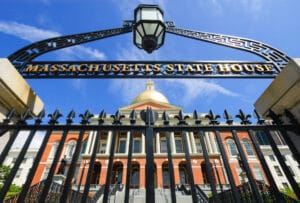Gov. Charlie Baker pitched his nearly $700 million tax relief package Tuesday as a way to keep more money in the pockets of parents, low-income workers and seniors, prompting some lawmakers to probe into what populations would benefit and to what degree.
The assortment of tax breaks that Baker rolled out alongside the $48.5 billion fiscal 2023 budget he filed last month features changes to how the state handles estate and short-term capital gains taxes, and would increase tax credits for seniors and child care as well as the deduction for rent payments. It would also raise the income level at which Massachusetts residents are required to file taxes.
“Not only can we afford this tax proposal, we believe it’s time to give Massachusetts families back some of the tax revenue that they created through their hard work,” Baker told the Revenue Committee.
Baker and his budget chief, Administration and Finance Secretary Michael Heffernan, appeared before the panel in a newly reopened-to-the-public State House, speaking in-person to seven committee members while other lawmakers and speakers joined via video call to discuss the bill (H 4381).
Many of the committee’s questions involved Baker’s proposals to raise the threshold at which the estate tax kicks in and lower the tax rate on short-term capital gains, which critics said would primarily benefit wealthier residents.
Sen. Adam Hinds, who chairs the Revenue Committee with Rep. Mark Cusack, suggested he thought there was room to go bigger on credits for dependent and child care — saying the bump Baker proposed “doesn’t really strike me as significant or relief” and that now “is not the time for incrementalism” — and said the timing of the proposed rate cut for short-term capital gains was “jarring” after nearly two years of the pandemic and its economic upheaval.
“What people in my district are talking about is how Wall Street is going through the roof and breaking records,” said Hinds, a Pittsfield Democrat running for lieutenant governor. “And yet our food bank lines are going around the block, and so there’s a real disconnect in who benefits in the economy right now. And this is the timing for making sure our wealthiest have a bigger tax break?”
Baker said the existing tax “acts like a penalty, making Massachusetts particularly unfriendly to at least 60,000 middle income taxpayers who are hit with it each year who are trying to make responsible investments to support themselves and their family’s future.”
Rep. Erika Uyterhoeven pointed out that the changes to the estate tax credit would only affect those with estates worth over $1 million. Baker’s estate tax proposal carries a price tag of $231 million, which the Somerville Democrat contrasted with the $77 million in additional relief for renters.
Baker replied that adopting a new approach to the estate tax could have broader impacts by encouraging people to stay in Massachusetts.
“I personally believe it will net itself out eventually because we are losing many people — the older I get the more of them I know personally — who are making decisions based on our estate tax, becoming permanent residents of other states,” the 65-year-old governor said. “We don’t just lose their income when they move, we lose all of it after they move, forever, until they die.”
Massachusetts Taxpayers Foundation President Eileen McAnneny said changes to capital gains and estate taxes are of particular interest to retirees.
“People in retirement certainly are thinking about where they’ll choose to retire, and cost structure absolutely matters,” she said.
Phineas Baxandall of the Massachusetts Budget and Policy Center said almost two-thirds of Baker’s proposed estate tax break would go to the wealthiest two-fifths of estates subject to the tax, those valued above about $2.25 million. He said the two breaks “truly targeted” to low- income filers — raising the threshold at which people are required to pay state income tax and increasing the senior circuit breaker tax credit — are a small fraction of the total package.
“If the committee is committed to revenue cuts, we believe that these kinds of smaller cuts or other targeted changes such as increasing or extending eligibility for the commonwealth’s earned income tax credit make a lot more sense than these very large tax breaks that go disproportionately to households that need them the least,” Baxandall said.
Lawmakers will be making election-year choices on how to handle the lame-duck governor’s proposal. Some who testified during the hearing indicated Baker’s bill could serve as a starting point for the committee to assemble its own tax policy legislation.
Mike Festa of AARP Massachusetts floated incorporating a tax credit to support unpaid family caregivers, and Charlotte Bruce of Children’s HealthWatch at Boston Medical Center and the Healthy Families EITC Coalition suggested including expansions of the earned income tax credit.
Baker, after the hearing, said he took the committee’s questioning as a “really positive sign that we’ll be doing something for tax policy for the people of Massachusetts this session.”
“The tax rate and policy changes, there’s a lot in there, and I would expect that going through a process like this one, it will change,” he said. “And I think the most important thing for me is that, at the end of this, we’ve done some things to modernize our tax code, we’ve done some things to simplify our tax code, and we’ve given some tax breaks to people who need them and deserve them and continue to make ourselves more competitive, and that could be any combination of a bunch of those elements.”
Committee member Sen. Walter Timilty and ranking House Republican Rep. Michael Soter offered warm reviews of the bill. Timilty, a Milton Democrat, called Baker’s plan “a surgical strike in trying to make us more competitive.”
Soter, of Bellingham, said he was “truly excited” about the proposal.
“We are flooded with cash, and I always say the government is not in the business of showing profits,” he said. “We are in the business of being stewards of the taxpayers’ dollars, and when we have this much flush of cash, we need to give it back to those people that kept this economy going for two years.”
The group Citizens for Limited Taxation called for the the committee to endorse Baker’s bill, saying, “The time has arrived to revisit and update lagging tax policies.”
In written testimony, CLT executive director Chip Ford called an increase to the renter’s deduction “overdue,” and said Massachusetts has “the most onerous estate tax in the nation, long outdated and much in need of adjustment just to catch up with past value lost.”
Baker’s bill would:
- Cut the tax rate on short-term capital gains from its current 12 percent to 5 percent, a change Baker said would align it with the tax on other income and mirror the way other states treat short-term capital gains.
- Double the threshold at which the estate tax kicks in to $2 million. While the current tax applies to the full value of estates over $1 million, Baker’s proposal would tax only the amount above $2 million.
- Raise the income level at which people are required to file taxes. Currently, Massachusetts residents must file an income tax return if they earn $8,000 as a single filer, $14,400 as a head of household, or $16,400 as joint filers. Baker’s plan would raise the no-tax threshold to align with the federal level, bringing it to $12,400 for single filers, $18,650 for heads of households, and $24,800 for joint filers.
- Double the maximum allowed senior circuit breaker tax credit. The credit rises with inflation and the increase this year would have raised it from $1,170 to $2,340.
- Increase the cap on the rent deduction from $3,000 to $5,000. That deduction is limited to half of the rent paid during a tax year.
- Double the dependent care tax credit to $480 for one qualifying individual and $960 for two or more. Baker wrote in a budget-filing message that for those claiming the household dependent care credit, rates would also double to $360 for one qualifying individual and $720 for two or more.




 |
| 




